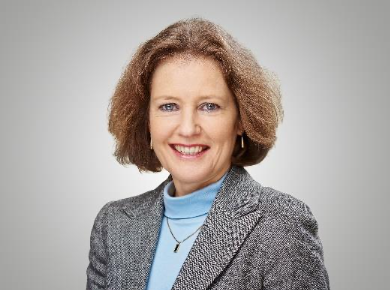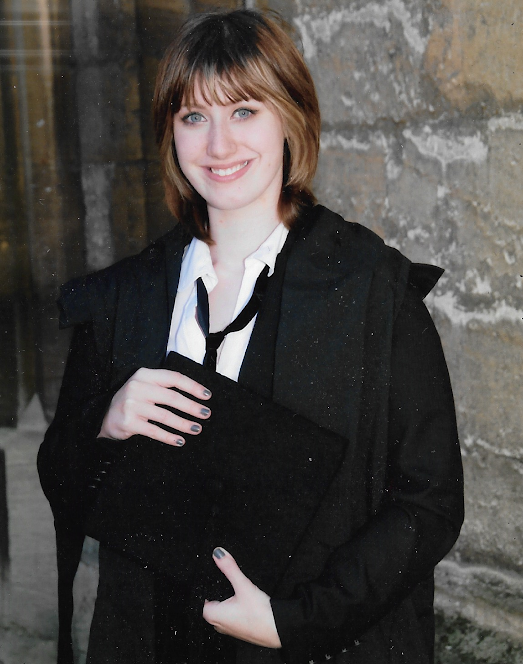Joanne-Louise Harrison-Gross (1981, Modern Languages)
 Although I was in the third year of St John's accepting women undergraduates, I don't remember experiencing any issues related to being a woman in College. It was all very civilised and the atmosphere was one of mutual respect, with other students, tutors and college staff. When I look back to grammar school too, I feel that everyone was treated equally. For the Modern Language undergraduate students, we had the balance of having a female majority on our course but being in the minority at College. Perhaps that says something though about what women were encouraged to study in that epoch. There were no female tutors at St John's, though we had a JRF in French, who was a role model for many of us.
Although I was in the third year of St John's accepting women undergraduates, I don't remember experiencing any issues related to being a woman in College. It was all very civilised and the atmosphere was one of mutual respect, with other students, tutors and college staff. When I look back to grammar school too, I feel that everyone was treated equally. For the Modern Language undergraduate students, we had the balance of having a female majority on our course but being in the minority at College. Perhaps that says something though about what women were encouraged to study in that epoch. There were no female tutors at St John's, though we had a JRF in French, who was a role model for many of us.
I have worked in industry and banking for over 30 years for four international companies, for the main part in marketing. I lead a trilingual life on a daily basis, and enjoy the brain gymnastics of expressing ideas in different ways depending on the culture and language. Learning another language is still important despite the use of English across the world!
When I left Oxford, I always seemed to be in male-dominated environments, whether in industry or at Insead Business School, where I did my MBA; there were around 20% female students at the time. It never particularly bothered me. What is essential though, I believe, is being excellent as a professional – and ready to use a sharp sense of humour. The current world is more aware of issues which women and minorities may face overtly or discretely and let's hope that there is a levelling up in the domains which still require attention.
I joined the Women's Network to be able to interact with an outstandingly talented group of people and to pass on my experience and offer advice. I would like to think that connecting students and alumni offers the chance of gaining informal knowledge and having quick access to a sparring partner easily. Contact should not be limited to having studied the same subject or being interested in the same profession. We all have multiple facets and diverse skillsets, and mine include working as a translator and interpreter, being a European marketing manager for commercial products, heading a marketing & communication department in a bank as well as being on the board of the bank's charitable foundation in Germany.
I have always been part of a dual career couple too. When I had my children I took a few months off and then went back to working full-time. The advantage in my industry was that you could start early in the day and finish “punctually”, as the Germans say. It is important to pick your partner well in life. Although perhaps the emotional labour gravitated in my direction, my husband, who is French, was always highly supportive of my career. An interesting book to read on this subject is Couples that Work by Jennifer Petriglieri, an Associate Professor of Organisational Behaviour from Insead, and we were one of the couples interviewed at length.
There are a set of skills which I think are key for women. Making sure you are numerically literate and comfortable with budgets, balance sheets, basic statistics and finance are definitely among them. You don't need to be a mathematical wizard, but in my industry you will inevitably encounter these areas and it seems to be a domain where women have statistically some catching up to do. Some educational systems demand early specialisation at school and preclude continuing with maths and economics. These skills are vital, irrespective of what you study at university and can be key to feeling comfortable in many work environments beyond what you might have studied. Investing in a course to acquire these skills if you don't have them is an excellent idea. The other skill I encourage is seeing yourself as a unique brand – which you can tailor and develop as you wish.
I am very much looking forward to interacting with students and alumni through this talented network.
Rose Sundt (2011, Oriental Studies)
 I read Oriental Studies (Japanese) graduating in 2015. My four years of study were a whirlwind of new experiences, beginning with First Week of a crisp Michaelmas term, with optimism and the vast chasm of the unknown; learning one of the hardest languages ab initio. It finished with a plunge into the muddy Cherwell after my Classical Japanese Special Texts paper, before embarking on adult life.
I read Oriental Studies (Japanese) graduating in 2015. My four years of study were a whirlwind of new experiences, beginning with First Week of a crisp Michaelmas term, with optimism and the vast chasm of the unknown; learning one of the hardest languages ab initio. It finished with a plunge into the muddy Cherwell after my Classical Japanese Special Texts paper, before embarking on adult life.
My own interests led me to study gender in Japanese literature and post-war narratives in East Asia. I spent a year abroad at Kobe University, sampling the world renowned Kobe beef (10/10) and practising the local dialect. I also worked a summer in Tokyo as a global intern for Japanese National Rail analysing their Olympics preparedness strategy.
After graduating, I entered the corporate world as a tax advisor for EY in Canary Wharf. I saw first-hand, how women at different stages navigate the murky waters of work/life balance in a global business setting. Later, I took up a position as an Assistant Correspondent for the London Bureau of a Japanese Newspaper, the Mainichi Shimbun. Duties were varied, including researching topics such as the future of cash in society and interviewing Boris Johnson (whose vernacular remains untranslatable).
I left this role because I fell in love with a Norwegian, who was finishing his PhD in his native land. In 2018, I decided to have one more big adventure and join him there, and reader, I married him! I became Office Manager at an International School in picturesque Trondheim and acquired another language. We returned to the UK in July 2020 to start new jobs, and I am happy to be able to join the Women's Network Steering Group as Communications Officer.
Since leaving university, I have been an interpreter and advocate for the Sake Industry, and encourage everyone to try sake (rice wine) as a gateway to Japanese culinary culture! I am now in the unique position of having worked in the UK, Japan and Norway – a kind of ‘Goldilocks and the Three Bears’ approach to employment/life harmony. My rich and varied experiences have shaped my own opinions of an ideal job and perfect personal life. I am learning to balance my cherished desire for independence with being part of wider teams, including my marriage. These are topics that I believe the Women’s Network should address and I hope to drive forward events which discuss the themes such as women’s ever evolving goals.
I was raised by a family of brilliant women: my mother, aunt, and grandmother. I was never aware that what they achieved was impressive because of their gender. Being female was not an obstacle to attaining their goals. My Scottish grandmother had to leave school at 14 years old, and was denied further education because she had to seek employment to help support her family. In spite of this, her tenacity, composure and strength of will has been an inspiration for me throughout my life. The older I get, the more I understand the women in my life and their choices – and I do believe turning into one’s mother is certainly not a curse! Having lived abroad I also appreciate how being ‘a foreigner’ or ‘an immigrant’ (as my own family originally were) or of a certain class, can affect your daily life and the opportunities presented. Family and friends are a valuable resource, and I want the Women’s Network to provide external support to those current, past or prospective students who are in need of it.
I chose to study Japanese simply because I relished the chance to immerse myself in a completely alien society, language and history – which turned out to be both Japan and Oxford. I adored my time at Oxford University, even though there were demanding and intense periods. I found that my male friends approached these pressure points differently, and it was one of the first times I was conscious of the male/female divide. I attended the Springboard programme, and hearing my female peers (who always seemed so on top of things) talk about their stress was eye opening.
I see the Women’s Network as vital in encouraging sharing personal journeys and offering support, as the members of SJC progress through life. By offering a wide variety of intellectual and social (hopefully soon physically present) opportunities we can create a powerful network comprising strong women and their supporters. I am proud to be part of this.
Click here to read about other members of our Steering Group